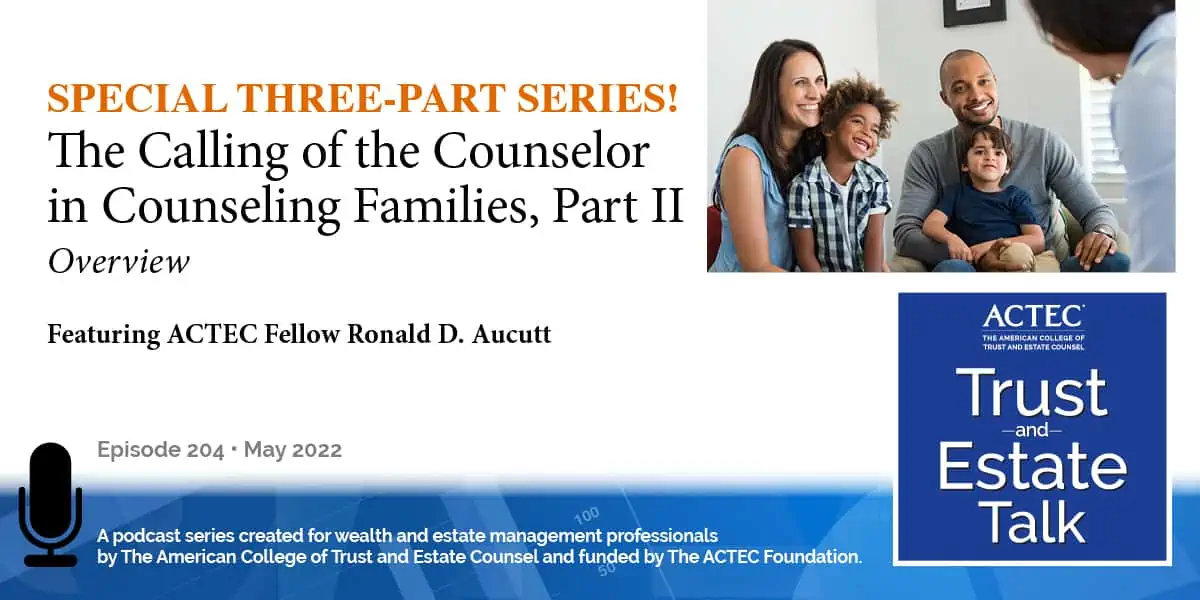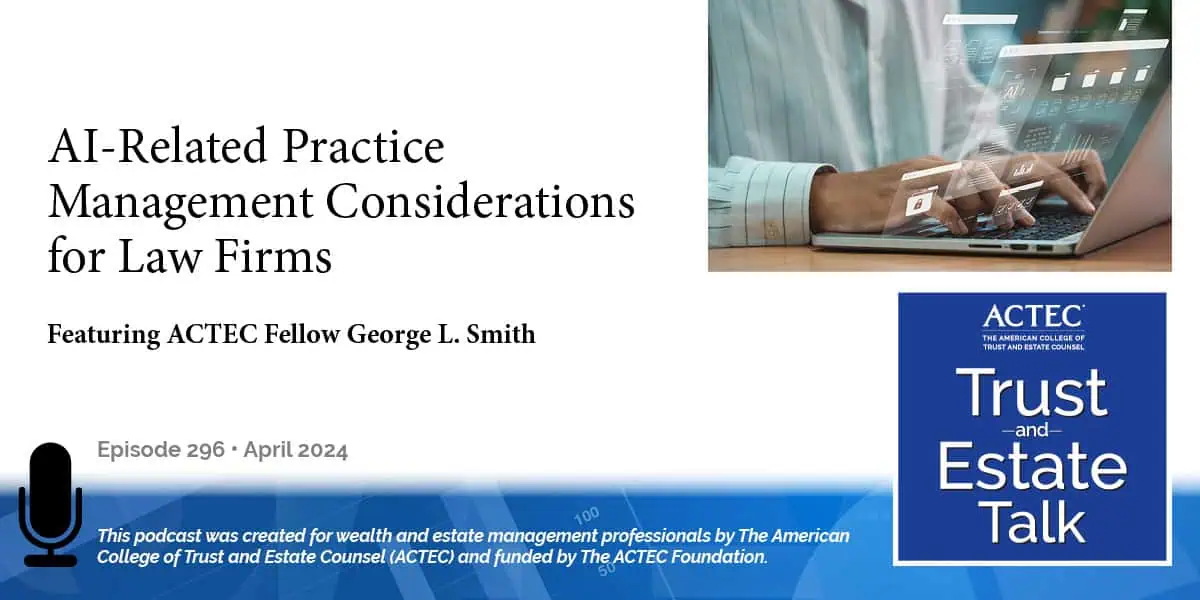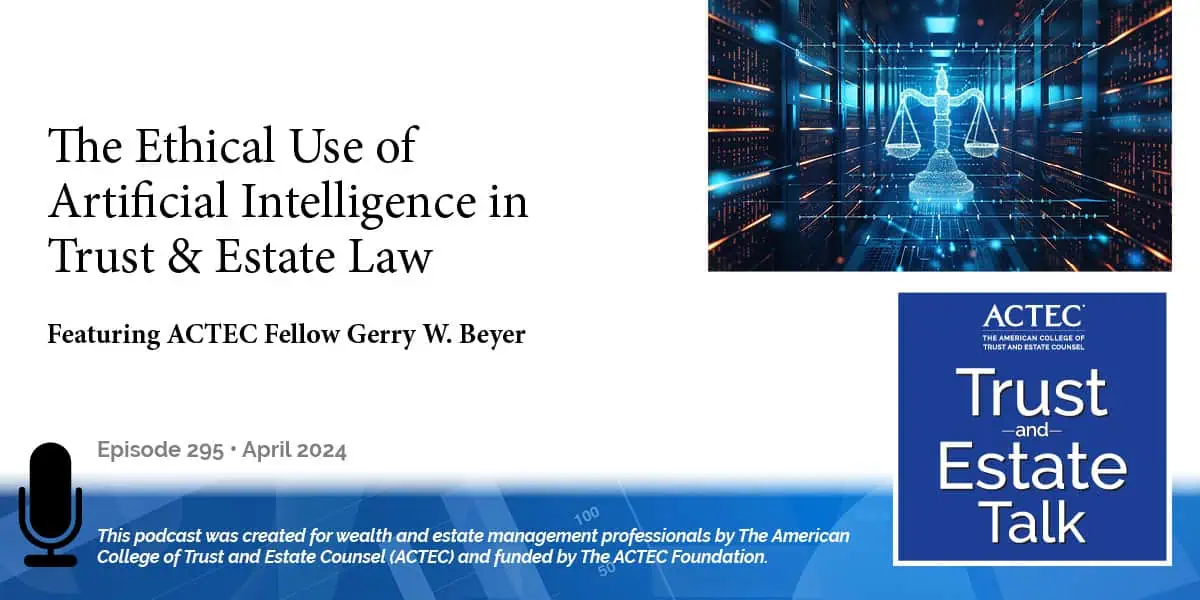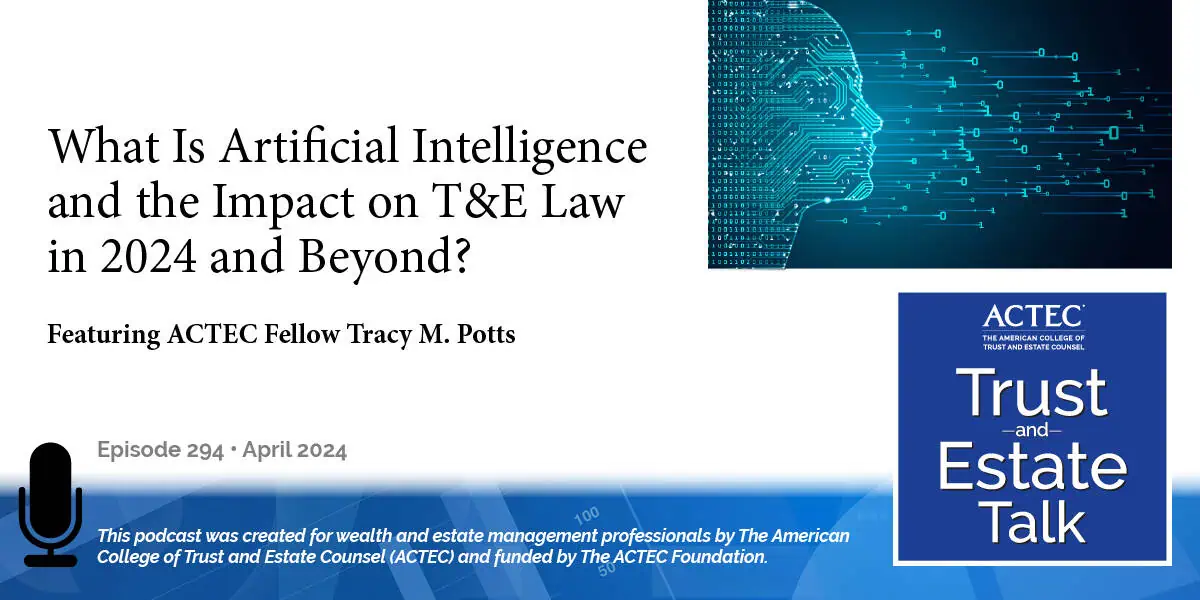The Calling of the Counselor in Counseling Families: Overview

“The Calling of the Counselor in Counseling Families” is a three-part special:
- Overview: An introduction and overview to the lecture. – this podcast, posted May 31, 2022
- Part 1: “Coaching Up” – posted June 7, 2022
- Part 2: “Nourishing Family Values” – posted June 14, 2022
- Part 3: “Challenges of the Counselor” – posted June 21, 2022
“The Calling of the Counselor in Counseling Families – Part II,” that is the subject of today’s ACTEC Trust and Estate Talk.
Transcript/Show Notes
This is Doug Stanley, ACTEC Fellow from St. Louis, Missouri. In March, during the ACTEC Annual Meeting, Past President Ron Aucutt gave the 2022 Joseph Trachtman Memorial Lecture to an attentive room of ACTEC Fellows. This year’s lecture was a continuation of the Trachtman Lecture he gave in 2011, “Creed or Code the Calling of the Counsellor in Advising Families.” Today, Ron will give us an overview of his lecture which the ACTEC Trust and Estate Talk is pleased to share over the next few podcasts. Welcome, Ron.
Thank you very much, Doug. We ACTEC Fellows, and estate planners in general, advise and assist our clients about a lot of things… taxes; passing wealth on to the right people with the right vehicles, and right conditions, and the right people in charge of the process; making documents both durable and appropriately flexible; designating beneficiaries for retirement plans, and so forth. I talk and write a fair amount about those things, especially taxes. But, when President Karen Moore asked me to give the Trachtman Memorial Lecture at the Annual Meeting in 2011, and again when President Steve Akers and Ann Burns asked me to give the Trachtman Lecture in 2022 at the Annual Meeting in San Diego, I deliberately resolved to step out of my tax-focus comfort zone and challenge the audience to step out of their comfort zone to think more about the importance of counseling clients about identifying and nourishing their shared family values and strategically transmitting a legacy of those values to their heirs.
Family Values Legacy: Ingredients
The clarification, preservation, and transmission of a family values legacy requires planning and effort and, just as with the technical things like taxes and documents, we can help. In my Trachtman lecture, like the one 11 years ago, I tried to provide both motivation and ideas for doing that.
First, we need to care about these goals and care about our clients and their commitment to these goals and show them that we care. Then we need to see meaningful family interaction and communication as the key, both to hold the family together and to developing and treasuring a family values legacy. In the 11 years since I first addressed this subject, the subject has, if anything, been made even more important and urgent by the COVID pandemic, which has both threatened regular interaction and simultaneously motivated technological workarounds to facilitate interaction.
I emphasized in my lecture that while virtual meetings can provide a convenient way to catch up between in-person meetings, they should never be viewed as a replacement for in-person meetings with eye contact, gestures, smiles and frowns, and other body language. This is especially true in a family. At the same time, the encouragement of genuine and caring interaction starting in the family has also been made more important and urgent by the greater coarseness and tension, and divisiveness we have observed in our public and private discourse. As well as by increasing awareness of injustice and threats to peace in the world.
My lecture summarized the ingredients of this type of family interaction in five bullet points:
- Spending time together
- Shedding tears together
- Sharing joys together
- Serving others together, and
- Sustaining values together
Family Values Legacy: Challenges & Questions
The last half of my lecture addressed 10 challenges or questions that a client or counselor might encounter when trying to make these things happen. For some of these challenges, I offered potential answers and for a few of them I just raised the question to create awareness in addressing individual scenarios on a case-by-case basis. These ten challenges are:
- The presumption that building a legacy is about exalting the legacy builder, rather than building values in the descendants.
- Selfishness that prevents senior generation clients from truly loving their children and other descendants.
- Difficulty for the senior generation to give up control.
- Defining the family in the first place.
- Determining how long a family values legacy should last.
- Advising the family that may not have a family values legacy.
- Expanding the benefit of a family values legacy beyond the family.
- Applying these principles when, in effect, there is no family.
- Defining success in these endeavors.
- And, finally, asking how we can help and how ACTEC can help.
Caring Counsel: Coaching Up
It was an honor, Doug, for me to give this lecture, and especially to have my whole family in San Diego with me. That prompted me to recall the ten years when my sons were playing high school and college football and several times in my lecture I used the sports expression “coaching up,” meaning motivating players to improve, encouraging them to bring their commitment and performance to a higher level, and coaching them up to that higher level of play with the objective of reaching a higher level of achievement, success, and fulfillment. That, I think, is the aspiration we should have for our relationships with estate planning and legacy planning clients. I hope many will have the opportunity to listen to the lecture and be as encouraged as I was while preparing for it to better serve our clients by coaching them up.
Thank you, Ron. Thank you very much for sharing your wisdom and knowledge.
This podcast was produced by The American College of Trust and Estate Counsel, ACTEC. Listeners, including professionals, should under no circumstances rely upon this information as a substitute for their own research or for obtaining specific legal or tax advice from their own counsel. The material in this podcast is for information purposes only and is not intended to and should not be treated as legal advice or tax advice. The views expressed are those of speakers as of the date noted and not necessarily those of ACTEC or any speaker’s employer or firm. The information, opinions, and recommendations presented in this Podcast are for general information only and any reliance on the information provided in this Podcast is done at your own risk. The entire contents and design of this Podcast, are the property of ACTEC, or used by ACTEC with permission, and are protected under U.S. and international copyright and trademark laws. Except as otherwise provided herein, users of this Podcast may save and use information contained in the Podcast only for personal or other non-commercial, educational purposes. No other use, including, without limitation, reproduction, retransmission or editing, of this Podcast may be made without the prior written permission of The American College of Trust and Estate Counsel.
If you have ideas for a future ACTEC Trust & Estate Talk topic, please contact us at ACTECpodcast@ACTEC.org.
© 2018 – 2024 The American College of Trust and Estate Counsel. All rights reserved.
Latest ACTEC Trust and Estate Talk Podcasts

AI-Related Practice Management Considerations for Law Firms
A discussion for law firms about how to incorporate AI in their practice management, including staff considerations, the “billable hour,” and more.

The Ethical Use of Artificial Intelligence in Trust & Estate Law
A law professor offers insights into the risks, rewards, duties and ethical considerations of lawyers using AI in their T&E practices.

What Is Artificial Intelligence and the Impact on T&E Law in 2024 and Beyond?
A primer on the types and uses of AI, then a deeper dive into the impact on trust and estate law from types to applications to ethical considerations.

